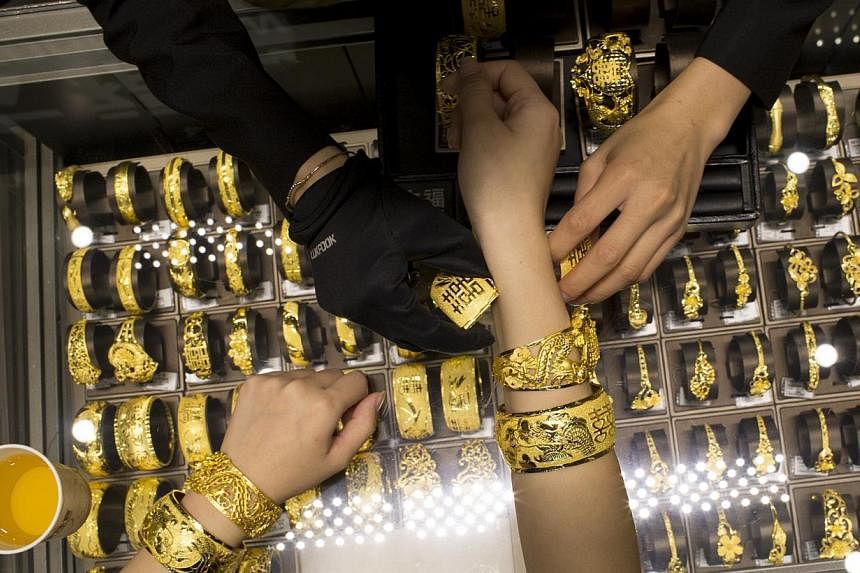GOLD, which enjoyed a brief resurgence earlier this year, seems to be losing ground amid stagnant prices and a rising greenback.
Industry watchers told The Straits Times that demand for gold has been softening, as prices remain stuck in the range of US$1,180 to US$1,220 per ounce.
Last Friday, gold holdings of SPDR Gold Trust, the largest gold-backed exchange-traded fund globally, languished at 723.91 tonnes - well down from the high of 773 tonnes in February.
Transactions for the Singapore Gold Kilobar Contract last month were down to merely 16, compared with a total of 43 in February, according to data from the Singapore Exchange,
Similarly, Mr Torgny Persson, chief executive of precious metals dealership BullionStar, noted that the firm is seeing fewer people buy gold today.
BullionStar logged just 2,477 transactions for gold purchases in the first quarter this year, fewer than the 3,028 in the fourth quarter of last year.
"The relative stability of the price of gold is keeping investors and savers on the sideline to some extent," said Mr Persson, noting that the gold spot price has been keeping within the range of $47.67 to $58.50 a gram.
"We generally see more transactions in periods when there's more fluctuation in the price."
Trade over the past 12 months, noted ANZ commodity strategist Victor Thianpiriya, has been long on the US dollar, and short on gold.
"Investors don't have conviction, so this means light volumes and very little interest."
Mr Wayne Gordon, executive director and portfolio strategist at UBS Wealth Management, cautioned that there could be "further downside" for gold, once the Federal Reserve starts hiking interest rates.
UBS expects this to start occuring from September.
OCBC Bank economist Barnabas Gan noted that short-term events - such as the ongoing Greece debt woes, as well as a "weaker-than-expected" global economic recovery - could "give gold wings", and allow it to play its role as a safe-haven asset.
But "the firmer (US) dollar story is likely here to stay".
Mr Gan remains bearish on gold, and expects it to fall further to US$1,050 by the end of this year.
Ms Beh Hsia Wa, director of UOB Bullion and Futures, however, is more optimistic on the gold market, given that there continues to be "supportive buying from central banks and strong private investment demand".
Phillip Futures investment analyst Howie Lee said that gold prices are likely to pick up "in the very long run", especially as "global economic recovery ramps up jewellery demand in China and India".
"Unique tastes for exotic investment vehicles involving gold and other commodities may also be piqued as investors get more sophisticated," he added.
For starters, though, investors who are looking to diversify their portfolio with an investment in gold can consider buying it in its tangible form - gold bullion coins, gold bars or gold jewellery.
Buying physical gold, said Mr Persson, is an easy and safe way of investing in the yellow metal, as there is "no counterparty risk, and you can take possession of the gold".
Investors can also store their gold in gold vaults operated by several bullion banks such as ANZ Bank, Credit Suisse, DBS Bank, Deutsche Bank and UBS.
Mr Lee, however, noted that holding physical gold often comes at a premium to paper gold, as it prices in warehouse and storage costs.
The latter type of gold investments - in the likes of gold futures or gold exchange-traded funds - are likely to be more "cost-efficient", he said.
Added Ms Beh: "Gold may be a good approach to balance one's portfolio as previous metals have shown strong returns in recent years."
She noted that gold is often seen as an attractive inflation hedge, a safer asset during times of crisis, and an internationally recognised store of value during currency volatility.
"However, investors need to take the strength or weakness of their home currency into consideration when making these investment decisions," added Ms Beh.


